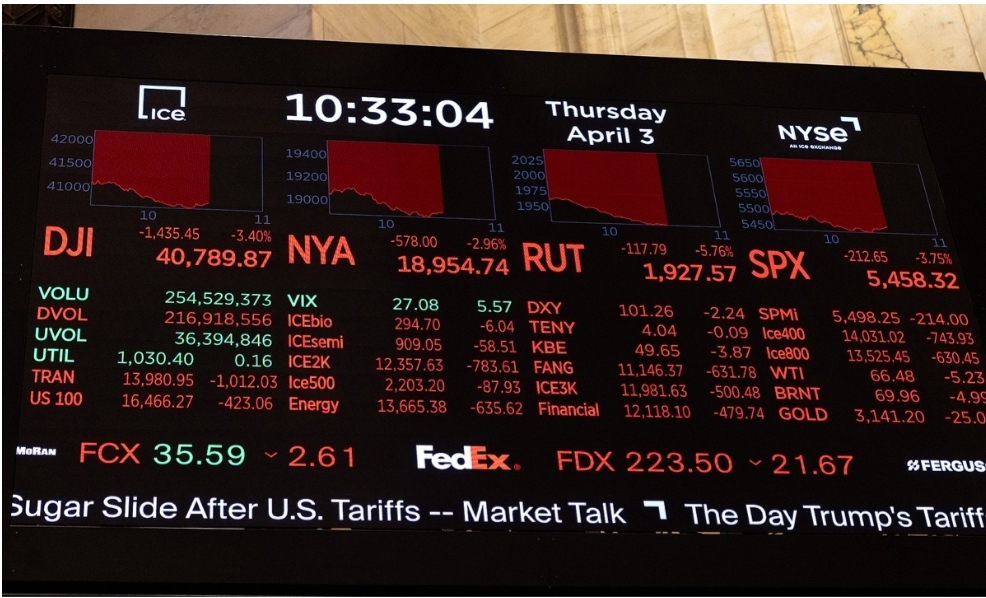Trump’s Tariffs Hurt US Itself : Stocks Plunge Badly

Photo: VCGUS
stocks plummeted on Thursday, with the Dow Jones Industrial Average nose-diving 1,679 points, and the S&P 500 and Nasdaq experiencing their most significant drops since 2020 after the US government announced sweeping so-called reciprocal tariffs, raising the risk of a global trade war that could plunge the economy into a recession, according to US media reports.
The Dow Jones Industrial Average tumbled 1,679 points, or 3.98 percent, to close at 40,545, marking its worst session since June 2020, CNBC reported.
The Nasdaq Composite plummeted by 5.97 percent and ended at 16,550, registering its biggest decline since March 2020, according to the report.The S&P 500 sank by 4.8 percent, more than in major markets across Asia and Europe, marking its worst day since the COVID pandemic crashed the economy in 2020, AP reported.
The sharp drop in the US stock market is a direct result of rising costs and trade concerns stemming from the US “reciprocal tariff” policy, which has severely impacted market sentiment and led to widespread sell-offs.
The market panic suggests that short-term volatility and mid-term risks have become widely acknowledged. If the US continues to implement its “reciprocal tariff” policy, along with inflationary pressures and a slowdown in consumer demand, the risk of a recession in the US economy may indeed increase.
Little was spared in the financial markets as fear flared about the potentially toxic mix of weakening economic growth and higher inflation that tariffs can create. Everything from crude oil to Big Tech stocks to the value of the US dollar against other currencies fell. Even gold, which hit records recently as investors sought something safer to own, pulled lower. Some of the worst hits walloped smaller US companies, according to AP.
Shares of multinational companies tumbled. Nike and Apple dropped 14 percent and 9 percent, respectively. Big seller of imported goods were among the hardest hit, CNBC reported.
A baseline tariff rate of 10 percent on all countries goes into effect on April 5. Even bigger duties against countries that levy higher rates on the US will be charged in the coming days, according to the US government.
The US’ largest trading partners have vowed to retaliate against Washington’s sweeping tariff announcement. Canada was the first to respond, announcing a 25 percent counter-tariff on non-USMCA-compliant vehicles imported from the US.
The EU, another major partner, is also preparing its own countermeasures, according to CNN.WTO Director-General Ngozi Okonjo-Iweala, expressed serious concern on Thursday over the decline in global trade and the potential for an escalating tariff war, fueled by US tariff measures.
Iweala said in a statement that the US tariff measures will have “substantial implications for global trade and economic growth prospects.”
The sweeping US tariff hikes have seriously disrupted the global trade system and left the WTO effectively paralyzed.
The US’ arbitrary tariff moves raised the costs of imported goods in the US, stifling production and distribution while pushing inflation higher.
It will take time for the US to establish its internal manufacturing and supply systems, while some production capacity outside the country has been forced to shut down, Dong noted.
US President Donald Trump declared a “national emergency” and announced a sweeping “reciprocal” tariff policy on Wednesday, setting a baseline tariff of 10 percent on all imported goods, with higher tariffs on many countries, as reported by US media.
Multiple countries, including Canada, Brazil, Japan and China, expressed opposition after the announcement of the sweeping tariffs.
The global economic slowdown demands international cooperation. The US tariff hikes hurt its trade partners and ultimately undermine its own economy.
From Trump’s perspective, the tariff hikes are designed to make the US stock market “boom,” but in reality, they may only accelerate the decline of the US economy.
Altogether, the proposed tariffs could knock down US economic growth by 2 percentage points this year and raise inflation close to 5 percent, AP reported, citing UBS.




